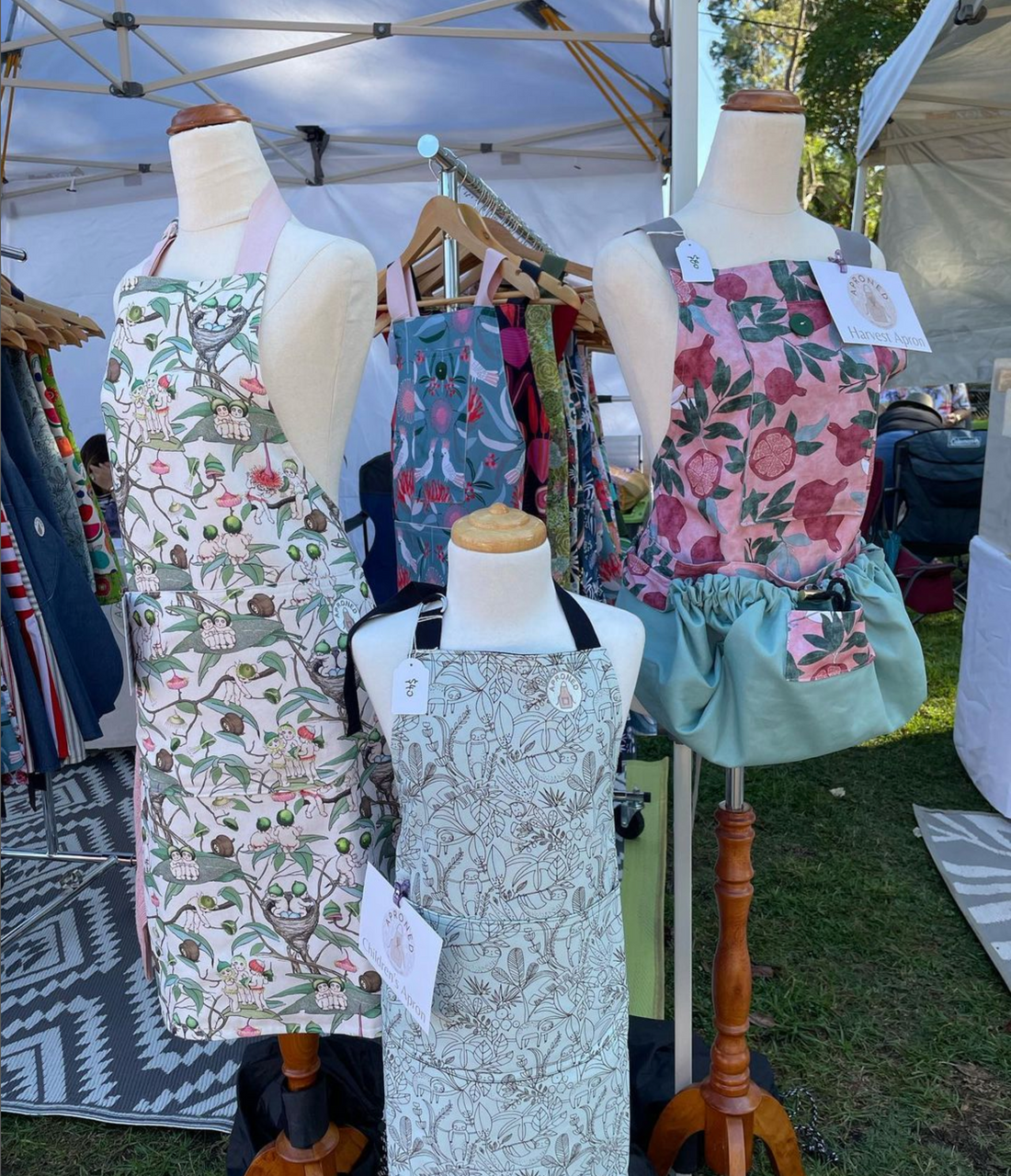What jobs wear aprons?

Share
Aprons have long been a symbol of certain professions, often associated with practicality and protection. From the bustling kitchens to the meticulous laboratories, aprons serve as a functional and sometimes ceremonial garment. Let's delve into the various professions where aprons are not just an accessory but a necessity.
1. **Chefs and Cooks**: Perhaps the most iconic wearers of aprons are those in the culinary industry. Chefs and cooks don aprons for a multitude of reasons. Primarily, they protect against spills, splatters, and heat. The apron is also a convenient place to wipe hands or hold a towel, and in many kitchens, the colour or style of the apron can indicate rank or experience.
2. **Bakers**: Bakers, like chefs, wear aprons for protection against flour, dough, and other baking ingredients. Their aprons tend to be heavier to withstand the rigorous and often messy process of baking.
3. **Baristas**: In the world of coffee and cafes, baristas sport aprons to protect their clothes from coffee stains and milk splashes. The pockets are particularly useful for holding order pads, pens, and other tools of the trade.
4. **Butchers**: Butchers wear heavy-duty aprons, often made of leather or thick canvas, to protect against blood, meat juices, and sharp tools. These aprons are designed to be durable and easy to clean, essential in maintaining hygiene in meat handling.
5. **Blacksmiths and Metalworkers**: In the intense environment of metalworking, aprons are a form of armour against sparks, heat, and sharp objects. Traditionally made from leather, these aprons are designed to be fire-resistant and durable.
6. **Carpenters and Woodworkers**: Aprons in carpentry and woodworking serve as a protective layer against wood shavings, sawdust, and tools. They often have multiple pockets and loops for holding tools, nails, and other essentials.
7. **Artists and Sculptors**: Artists, especially those working with messy mediums like clay or paint, wear aprons to protect their clothing. These aprons are often splattered with a history of their creative endeavours.
8. **Gardeners and Florists**: Gardening aprons protect against dirt and provide handy storage for gardening tools. Florists also wear aprons to protect their clothes from soil, water, and plant sap.
9. **Hairdressers and Barbers**: Aprons for hairdressers and barbers are designed to keep hair clippings and hair products off their clothes. These aprons are usually lightweight and easy to clean.
10. **Jewellers**: In the delicate work of jewellery making, aprons help to catch small pieces of precious metals or gemstones that may fall. They also protect the jeweller's clothes from chemicals and tools used in the process.
11. **Laboratory Technicians**: In the realm of science, lab technicians wear aprons as a protective barrier against chemicals, biological materials, and other potentially hazardous substances.
12. **Dental Hygienists and Technicians**: In the dental field, aprons are worn for hygiene and to protect against contaminants. They are also used to shield patients during X-rays.
13. **Cleaners and Housekeepers**: For cleaners, aprons are both protective and practical, providing a means to carry cleaning supplies and protect clothing from cleaning agents.
14. **Craftsmen and Tinkers**: Those involved in various crafts and tinkering, such as clockmakers or model builders, wear aprons to protect their clothes and to keep their tools close at hand.
15. **Waitstaff**: In many restaurants and cafes, waitstaff wear aprons for a neat appearance, and to have a handy place to carry notepads, pens, and other essentials for service.
16. **Fishmongers**: Dealing with fish scales, water, and ice, fishmongers wear aprons for protection and to maintain hygiene standards.
17. **Tattoo Artists**: Tattoo artists wear aprons to protect themselves from ink splatters and maintain a sterile environment.
18. **Glassblowers**: In this high-heat environment, aprons are worn to protect against burns from molten glass and the heat of the furnaces.
19. **Cheesemakers**: In the process of making cheese, aprons protect against spills and help maintain cleanliness.
20. **Pottery and Ceramic Artists**: Like sculptors, these artists wear aprons to protect their clothes from clay, glaze, and other materials involved in pottery making.
In conclusion, aprons are a versatile and essential part of many professions. They provide protection, practicality, and in some cases, signify the identity and status of the wearer. From the heat of the forge to the buzz of the coffee shop, aprons are a testament to the diverse and skilled nature of various trades and crafts.
1. **Chefs and Cooks**: Perhaps the most iconic wearers of aprons are those in the culinary industry. Chefs and cooks don aprons for a multitude of reasons. Primarily, they protect against spills, splatters, and heat. The apron is also a convenient place to wipe hands or hold a towel, and in many kitchens, the colour or style of the apron can indicate rank or experience.
2. **Bakers**: Bakers, like chefs, wear aprons for protection against flour, dough, and other baking ingredients. Their aprons tend to be heavier to withstand the rigorous and often messy process of baking.
3. **Baristas**: In the world of coffee and cafes, baristas sport aprons to protect their clothes from coffee stains and milk splashes. The pockets are particularly useful for holding order pads, pens, and other tools of the trade.
4. **Butchers**: Butchers wear heavy-duty aprons, often made of leather or thick canvas, to protect against blood, meat juices, and sharp tools. These aprons are designed to be durable and easy to clean, essential in maintaining hygiene in meat handling.
5. **Blacksmiths and Metalworkers**: In the intense environment of metalworking, aprons are a form of armour against sparks, heat, and sharp objects. Traditionally made from leather, these aprons are designed to be fire-resistant and durable.
6. **Carpenters and Woodworkers**: Aprons in carpentry and woodworking serve as a protective layer against wood shavings, sawdust, and tools. They often have multiple pockets and loops for holding tools, nails, and other essentials.
7. **Artists and Sculptors**: Artists, especially those working with messy mediums like clay or paint, wear aprons to protect their clothing. These aprons are often splattered with a history of their creative endeavours.
8. **Gardeners and Florists**: Gardening aprons protect against dirt and provide handy storage for gardening tools. Florists also wear aprons to protect their clothes from soil, water, and plant sap.
9. **Hairdressers and Barbers**: Aprons for hairdressers and barbers are designed to keep hair clippings and hair products off their clothes. These aprons are usually lightweight and easy to clean.
10. **Jewellers**: In the delicate work of jewellery making, aprons help to catch small pieces of precious metals or gemstones that may fall. They also protect the jeweller's clothes from chemicals and tools used in the process.
11. **Laboratory Technicians**: In the realm of science, lab technicians wear aprons as a protective barrier against chemicals, biological materials, and other potentially hazardous substances.
12. **Dental Hygienists and Technicians**: In the dental field, aprons are worn for hygiene and to protect against contaminants. They are also used to shield patients during X-rays.
13. **Cleaners and Housekeepers**: For cleaners, aprons are both protective and practical, providing a means to carry cleaning supplies and protect clothing from cleaning agents.
14. **Craftsmen and Tinkers**: Those involved in various crafts and tinkering, such as clockmakers or model builders, wear aprons to protect their clothes and to keep their tools close at hand.
15. **Waitstaff**: In many restaurants and cafes, waitstaff wear aprons for a neat appearance, and to have a handy place to carry notepads, pens, and other essentials for service.
16. **Fishmongers**: Dealing with fish scales, water, and ice, fishmongers wear aprons for protection and to maintain hygiene standards.
17. **Tattoo Artists**: Tattoo artists wear aprons to protect themselves from ink splatters and maintain a sterile environment.
18. **Glassblowers**: In this high-heat environment, aprons are worn to protect against burns from molten glass and the heat of the furnaces.
19. **Cheesemakers**: In the process of making cheese, aprons protect against spills and help maintain cleanliness.
20. **Pottery and Ceramic Artists**: Like sculptors, these artists wear aprons to protect their clothes from clay, glaze, and other materials involved in pottery making.
In conclusion, aprons are a versatile and essential part of many professions. They provide protection, practicality, and in some cases, signify the identity and status of the wearer. From the heat of the forge to the buzz of the coffee shop, aprons are a testament to the diverse and skilled nature of various trades and crafts.
